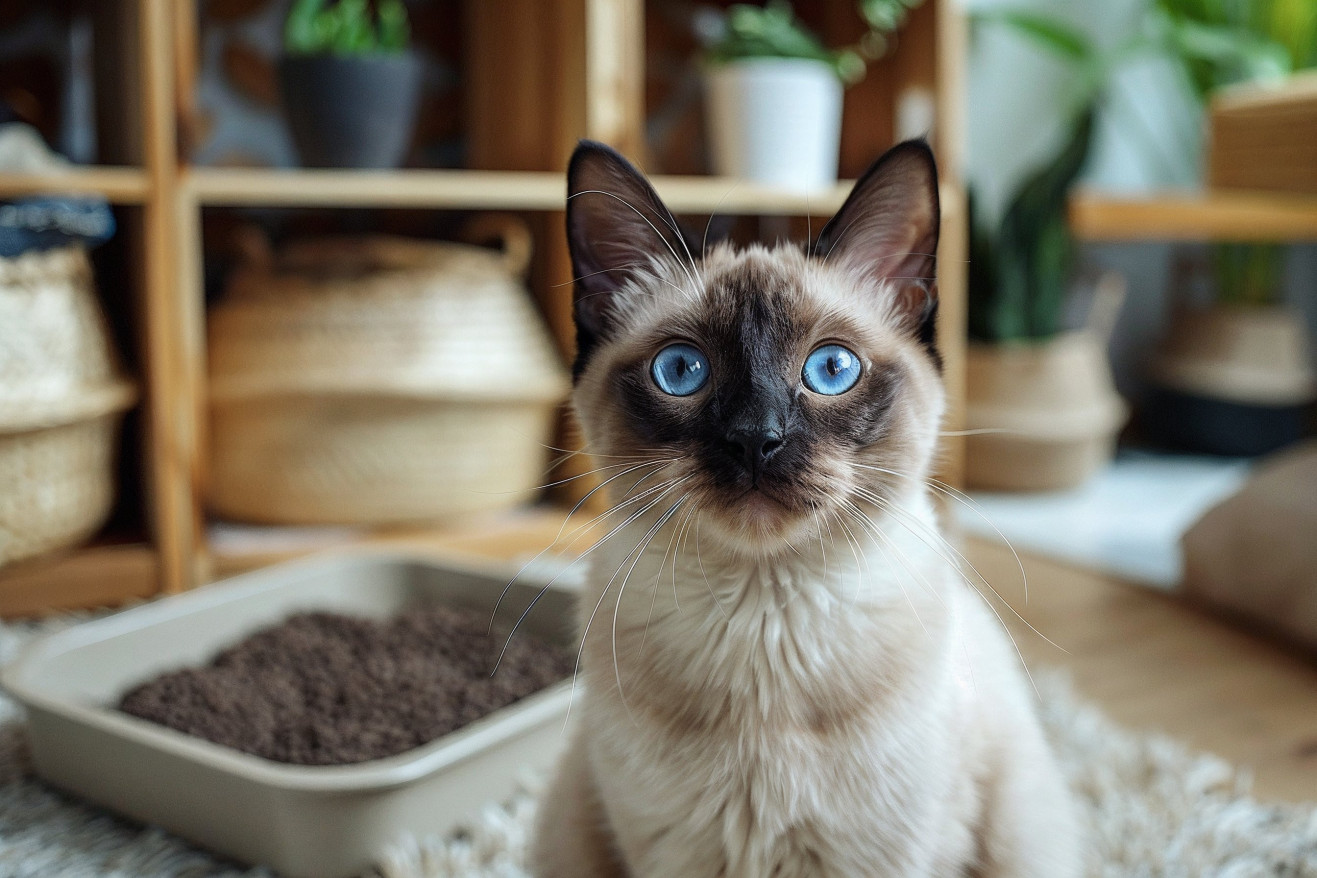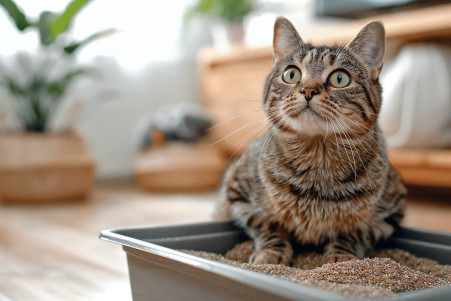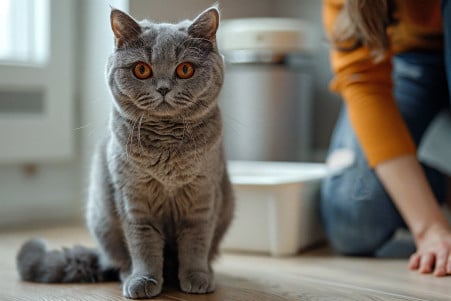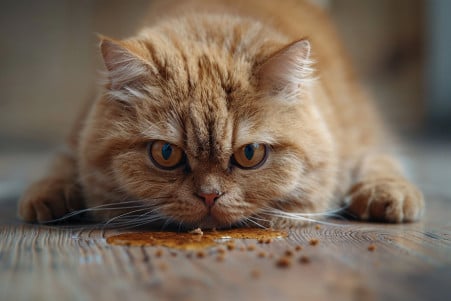How Often Should Cats Poop? A Vet's Guide
9 April 2024 • Updated 8 April 2024

If you’ve ever owned a cat, you’ve probably asked yourself how often your furry friend should be using the litter box. While most cats poop once a day, the truth is that healthy cats can poop anywhere from once every 1-2 days on average. There are a number of factors that can affect how often a cat poops, including diet, age, and health issues. For example, kittens may poop more often, and older cats may poop less often due to a loss of appetite.
To help you figure out what’s normal and what’s not, we’ve looked at the latest research from veterinarians to find out what’s considered a "normal" frequency for cats to poop. This article includes a summary of studies on cat gut health and how it’s affected by diet and age, as well as expert advice on how to monitor your cat’s pooping habits. Armed with this information, you’ll be able to tell if there’s a problem with your cat’s pooping frequency.
How often should cats poop?
How to Tell If Your Cat Has an Abnormal Bowel Movement
While a healthy adult cat will poop once or twice a day, there are a few things to look out for that could be a sign of a larger issue. According to WebMD, if your cat has diarrhea for more than 24-48 hours, it's time to see a vet as it can lead to dehydration. Preventive Vet says that any change in your cat's poop schedule, including frequency, color, smell, or consistency, that lasts for more than a day or two is a cause for concern.
Constipation is another issue to watch out for. Cats.com says that if your cat hasn't pooped in 48-72 hours, you should see a vet. PetMD explains that if your cat seems to be straining or in pain when trying to poop, there could be a more serious issue at play like inflammatory bowel disease or a blockage in the rectum. On the other hand, if your cat is pooping more frequently and the amount of poop has increased, it could be a sign of a food intolerance, malabsorption, or another digestive issue.
In addition to watching your cat's litter box, if you notice that your cat is eating less and pooping less, that could be a sign that something is wrong. Paying attention to any changes in your cat's behavior and habits will help you catch any potential medical issues. The sooner you catch something, the sooner you can get your cat the help they need.
Why Do Cats Poop Outside the Litter Box?
According to The Spruce Pets, medical problems such as urinary tract infections, gastrointestinal issues, and arthritis are common reasons for litter box aversion. Meanwhile, Embassy Lakes Animal Hospital states that stress from changes in the home or schedule can cause marking outside the box.
Cats are known for being picky about their litter box habits. Dutch lists several reasons why cats may not want to use the litter box, including the location, size, type of litter, and cleanliness of the box. In addition, territorial disputes between cats in the household can lead to inappropriate elimination, according to the Cornell University College of Veterinary Medicine.
Older cats with cognitive dysfunction may forget to use the litter box or have trouble getting to it in time, so they may need extra help and accommodations, says the Cornell University College of Veterinary Medicine. It's important to figure out the cause of litter box avoidance in order to solve this issue.
How to Manage the Litter Box
Managing the litter box is an important part of keeping your cat's elimination behavior healthy. As noted by The Spruce Pets, it's best to have one more litter box than the number of cats in your home to make sure there are enough boxes to go around and prevent territorial issues or aversion. Best Friends Animal Society also recommends that the boxes be placed in quiet, easily accessible areas away from things like noisy appliances and high-traffic areas.
Keeping the box clean is also important. According to the ASPCA, the litter should be scooped of clumps and solid waste daily, with the entire box being changed every 1-2 weeks. Since cats can be so particular about the cleanliness of their litter boxes, making sure that the box is always clean can help ensure that it's used. You can also try different types of litter and boxes to see if your cat has a preference, as suggested by Best Friends Animal Society.
If you have more than one cat, The Spruce Pets recommends that you place litter boxes on every level of the home and in different rooms to help prevent territorial issues. This way, there are plenty of options and less chance of one cat monopolizing or guarding the boxes.
How to Clean Up Cat Poop and Urine Stains
For fresh stains, it's important to start by removing any solid waste with paper towels or a damp cloth, per HomeEdit. Then, apply an enzymatic cleaner that's specifically formulated to get rid of pet odors, such as Rocco & Roxie Stain & Odor Eliminator or Simple Solution Extreme, according to the Humane Society.
If the stains are old and dried, TMF Store recommends starting by scraping off any dried-on residue with a butter knife or another blunt object. Then, apply a mixture of white vinegar and water or hydrogen peroxide before using an enzymatic cleaner. Once you've cleaned the area, make sure to rinse it well and let it dry completely before sprinkling it with baking soda to help absorb any remaining smells.
If the stain has seeped into the carpet pad or subfloor, you may need to have the area professionally cleaned or even replaced, according to The Washington Post. Also, remember to wear gloves and work in a well-ventilated area when cleaning up after your cat to protect yourself from exposure to bacteria and other pathogens.
When to See a Vet for Litter Box Problems
If your cat has suddenly started pooping outside the litter box for no apparent reason, it’s time to see a vet, according to PetMD. Also, if your cat is experiencing diarrhea, constipation, straining, or a lack of bowel movements for an extended period, you should seek medical attention, says Preventive Vet.
Changes in the color, smell, or texture of your cat’s poop that last for more than a day could be a sign of an underlying medical issue, according to WebMD. If you’ve tried to make your cat more comfortable and they’re still avoiding the litter box, it’s time to see a vet, according to the Cornell University College of Veterinary Medicine.
Older cats may need to see the vet more often to check for age-related digestive or cognitive issues that could impact their litter box habits, according to the Cornell University College of Veterinary Medicine. By being aware of changes and seeking help when you need it, you can help your senior cat stay comfortable and regular.
Conclusion: How to Keep Your Cat's Litter Box Habits Healthy
Healthy adult cats will typically defecate one to two times a day. Keeping an eye on your cat's litter box behavior can help you understand their health and happiness. Making sure that you have the right litter box setup, that the box is clean, and that you're meeting your cat's needs will help you avoid any issues.
If you notice a sudden change in your cat's defecation habits or if they're avoiding the litter box, make sure to take them to the vet to rule out any medical concerns. By making sure you're taking care of your cat's needs, you can help them maintain healthy and regular litter box habits.


